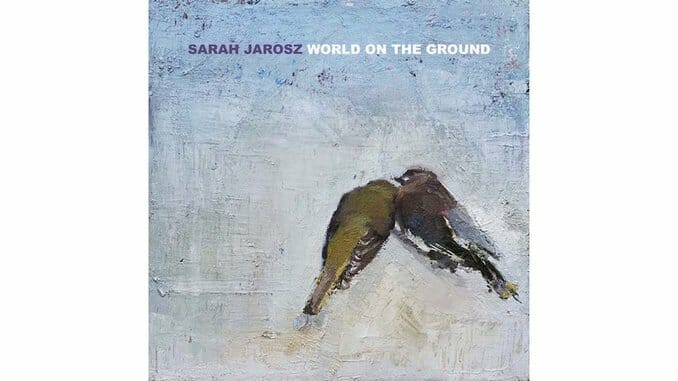Weary Yet Hopeful, Sarah Jarosz Returns Home on World On The Ground
The singer & multi-instrumentalist takes a breather in the wide open spaces of her native Texas on polished fifth LP
Music Reviews Sarah Jarosz
The world is on the ground, and Sarah Jarosz treads lightly over it.
As the title of her fifth LP so acutely suggests, our current moment is one defined by the downtrodden. In 2020, it very often feels like we’re all sinking slowly into a collective sunken place, spinning out of control and unable to get a grip, just like in Jordan Peele’s Get Out.
But World On The Ground is a personal album that was written long before the pandemic and the protests sparked by the murder of George Floyd, and its title, while suitable for 2020 moodcasting, refers to a different kind of trauma. During these soaring 35 minutes, Jarosz explores an identity crisis that’s totally inextricable from her upbringing in Wimberly, Texas, where the now 29-year-old began her journey from fledgling roots artist and mandolin prodigy (Her debut album, 2009’s Song Up In Her Head, arrived when she was still a teenager) to Americana royalty.
Throughout World On The Ground, which, for an album about the existential joys and pains of “adulting” and grappling with one’s roots, remains surprisingly springy and hopeful, Jarosz and her narrators are either nestled at home (“Eve,” who has her feet firmly planted in one place, discovers the beauty of her “little Texas town”) or far away from it (a “thousand miles,” to be exact, on “What Do I Do”). “Hometown” follows a spirited woman “on the verge of a breakdown” begrudgingly returning to her suffocating hometown, and the story plays out like a much more interesting and realistic version of Sandra Bullock’s in Hope Floats. Where Miranda Lambert returned to her roots for clarity and closure and Joy Williams to her family home in search of a peaceful respite, Jarosz’s character, like Bullock’s, flees for home as a means of safety and, really, because she has no other choice after “fizzling” out elsewhere. It’s a trajectory many young adults are navigating right now in the face of a pandemic and the longstanding lack of economic opportunity.
However, on the delightful “Maggie,” the woman in question can’t get away from home fast enough, seeking wanderlust in the never-ending highways of the American West. “Drive across the desert in a blue Ford Escape / hopefully this car will live up to its name,” Jarosz sings, nailing the automobile wordplay. The exhaustion settles in on “What Do I Do,” where Jarosz sings, “Early morning, waking up / took a sip from the coffee cup / eyes half open, bloodshot blue / could not sleep like I wanted to,” perfectly capturing the kind of grief that rips peace and rest from one’s routine.
“Orange and Blue,” which again sees Jarosz reminiscing on her Texas youth, is a melancholy mashup of blues guitar and Norah Jones-informed soft jazz, replete with mentions of nature, from a cypress tree to rolling thunder. Meanwhile, “I’ll Be Gone” toasts “the end of it all” as Jarosz dances around the flames of a crumbling relationship, or maybe the entire human race. Apocalyptic laundry lists are soon replaced by more traditional bluegrass fare, like the singsong of mountain ditty “Little Satchel,” where Jarosz’s real talents as a vocalist are most apparent.
Unfortunately, this album lacks the catchiness and immediacy of Jarosz’s previous work, both as a solo artist and with Sara Watkins and Aoife O’Donovan in their supergroup I’m With Her. These songs politely roll in like a sleepy cloud of fog, each one a little puff of mist no more distinguishable than the one before it. There are highlights, of course, particularly the song “Johnny,” one of the best folk songs of the year so far, which possesses a sneaky, flirty vibe that works really well for Jarosz. These songs often work better as singular entities than in the context of the entire inoffensive album, which has the tendency to swallow the flashier moments in its weariness.
But the occasional drudgery doesn’t totally interfere with the point of World On The Ground’s homecoming tale. On the toe-tapper “Empty Square” (which 15 years ago would’ve sounded right at home in an episode of Gilmore Girls), Jarosz takes a morbid turn yet again while recounting a nightmare that finds her “standing naked in an empty square.” “I’m getting swallowed up by all my choices,” she sings. “I’ll take a dive off your marble stairs / It’s all crumbling down.” Dark, isn’t it? One interpretation of World On The Ground could leave you with one of the saddest albums about millennial fear of aging and falling into an unsatisfying life ever written. But another reads this record as an honest—even hopeful—recollection of coming home again and all the emotions that accompany such a journey. Sometimes a season of flailing uncertainty is nothing more than a bump in the road.
Ellen Johnson is an associate music editor, writer, playlist maker, coffee drinker and pop culture enthusiast at Paste. She occasionally moonlights as a film fan on Letterboxd. You can find her tweeting about all the things on Twitter @ellen_a_johnson.